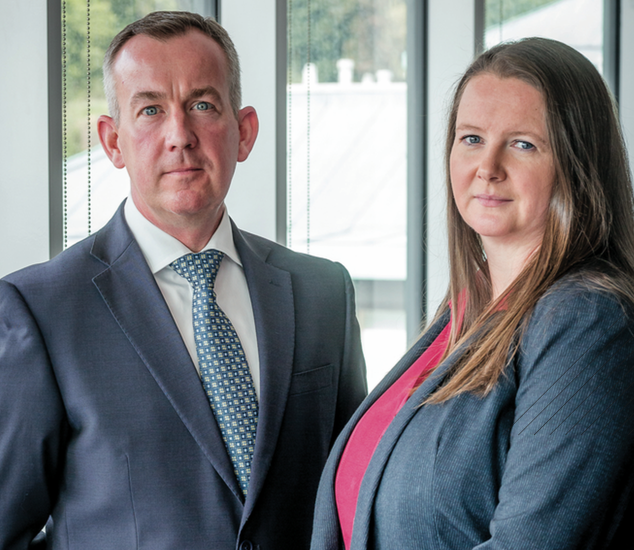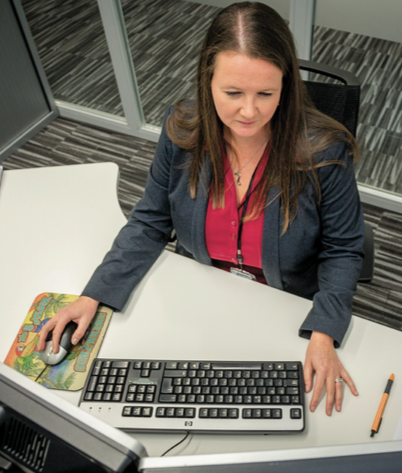

In order to hold its head up high as a finance centre of repute, Jersey can’t just say it’s squeaky clean - it also has to prove it. While the JFSC keeps a beady regulator’s eye on the industry, it’s the job of the police to assess if an organisation or individual has stepped over the criminal line.
To emphasise just how important this role is, in a time of budget cuts in most States departments, the police’s Joint Financial Crime Unit (JFCU) has been recently ‘beefed up’, with two Detective Inspectors now leading it compared to just one previously.
Express met the officers to find out what they planned to tackle:
"It’s now a case of two heads being better than one at the JFCU. After a cash injection from the States, Acting Detective Inspector Louise Clayson now leads the ‘Financial Intelligence Unit’ part of the team, while DI Mark Coxshall takes on the Operational Team. The move makes practical sense but it is also to prove that the Island is listening. Two years ago, Moneyval – the monitoring body of the Council of Europe tasked with assessing compliance with anti-money laundering and terrorism financing standards – gave Jersey its fourth ‘health check.’
Overall, the inspection team said that the Island was doing a good job, although it did conclude that, “…Jersey is recommended to review on a regular basis the adequacy of the FIU’s resources, and to further enhance the capacity of the relevant authorities to successfully investigate suspicions of domestic money laundering originating from Suspicious Activity Reports, foreign FIU inquiries or Mutual Legal Assistance requests.”
In simple terms, Moneyval said that the JFCU was a bit overstretched and could raise its game. So now, DIs Clayson and Coxshall are jointly in charge, but their roles are well defined. For those unaware of how the system works, compliance staff and anti-money laundering officers in banks, trust companies and other institutions are legally obliged to file a Suspicious Activity Report (or SAR) if they think there’s a whiff of criminality among clients. Warnings signs could be a question mark over tax (which make up a quarter of disclosures), irregular movements of cash, a high number of transactions, activity in a high-risk area, or perhaps a report in the media. Around 2,000 SARs are filed by finance houses each year through an online portal.

Pictured: DIs Clayson and Coxshall with Connect's Julien Morel.
DI Clayson’s job is to assess these SARs and work out what to do with them next, which could include passing them on to DI Coxshall, whose team will then investigate further. DI Clayson: “When a report comes in, my FIU team has to enhance it as much as we can. If, for example, it’s going to be part of a local investigation, we might use information held by the police on an individual or company but also reach out to other agencies that we think might hold additional information. If it’s international, we may identify the most appropriate jurisdiction to share that information with. It could, of course, be one piece of a much larger jigsaw that we’re not aware of. So, my team develop the intelligence to a point where we suspect that there has been criminal activity. We then share that intelligence package – with Mark’s team, if it is serious and complex. We don’t get involved in any investigation; we do the scoping and then pass it on.”
DI Coxshall: “My Operational Team follows nationally agreed criteria which will tell us if the investigation threshold has been reached. We have structures in place that test that criteria to identify the best route to go down, whether that’s regulatory intervention by the JFSC or, at the other end of the scale, using the Attorney-General’s powers to investigate serious and complex fraud. Just because a crime is revealed doesn’t necessarily mean it will be investigated by my team; it could be another, such as the Serious Crime Team, which is the old CID, but we tend to take on the complex and multi-jurisdictional investigations.”
Yes, the police are implementing the Moneyval recommendations but does the extra funding also suggest that financial crime is on the rise?
DI Coxshall: “Our main driver is to make sure that we, as a jurisdiction, can evidence ourselves as effective - not only do we have the regulation and legislation in place, but we also put our money where our mouth is. It doesn’t reflect that there is a growth in financial crime but this certainly isn’t a time for complacency. We need to keep pace with changing trends to maintain the good reputation of the Island.
“So, it is about showing our effectiveness, which was difficult at times with one Detective Inspector in charge. We now have total focus, whether that be intelligence or operations. Before the Proceeds of Crime Law, [pre-1999], there was a different type of crime in Jersey and there were some well-publicised cases of illegal money held here. Now we have to keep pace with the more localised crime, perhaps making sure than an institution complies with a money laundering order or they are carrying out enhanced due diligence and recognising jurisdictional risk. The JFSC, for example, has just run a campaign around Independent Financial Advisers and making sure investors know where they put their money. It’s still the case that if it sounds too good to be true, it probably is.”
DI Clayson: “Certainly we are aware of an increase in cyber-crime but not everyone is paying attention. We still come across people who have been scammed out of their entire savings because they believed the nice person from another country asking for money.”
DI Coxshall: “There is no easy fix for financial crime but people can help by doing what they do carefully and properly, and that is as relevant to a professional compliance officer as it is to a retired couple looking to invest. You have to read the small print and ask the right questions.”

Pictured: DI Louise Clayson leads the 'Financial Intelligence Unit.'
As the two detectives get to work under the new JFCU structure, they are already looking ahead to the next Moneyval inspection in 2021/22.
DI Clayson: “Certain recommendations were made in 2015 and we need to show that we’ve made improvements. Particularly from the FIU perspective, we need to show that when we receive intelligence, we’re not just sending it straight on; we are looking at ways to enhance it.”
DI Coxshall: “Our biggest focus is showing effectiveness by using the tools we already have and making sure we have the right legislation in place. We’re doing what we can to respond to the last review but, equally, as a jurisdiction, we want to make sure we have our own house in order. Fortunately, we already have a voice on the Financial Crimes Strategy Group and the dialogue between us and partner agencies is good - I would say we’re at an enviable stage compared to other jurisdictions. That said, we obviously keep our boundaries too; the JFSC has a clear regulatory focus and we have a criminal one but there are always opportunities to share, which helps us to choose the right path for each individual case.
“We’ve both worked in lots of areas of policing so we’re very aware that in an island of this size, a lot of our relationships are face to face, on first-name terms. That brings many benefits but equally we have to stay on the line and not cross it. To be fair, people don’t test that and we are respected. There is some great work being done by institutions and the public sector so our structural change doesn’t in any way reflect that we need to step up because there is a problem. It’s more that we need to ensure that our reputation is maintained.”
DI Clayson: “Of course, we are aware that industry has its own commercial risks, particularly when it comes to the restraint of assets. We’re not out to destroy the finance industry; we want to work with them to help them identify if there is criminality. And where there is, we try to be as efficient as we can, albeit our hands can be tied internationally if there is outside interest in funds that are held here.
"Of course, financial institutions have an interest themselves because the last thing they want is to face a money laundering order and prosecution because they’ve failed to file a SAR or identify criminality. That could be a commercial nightmare. We have good links with industry but we have to have that straight line because if intelligence does come in about a particular organisation, we have a duty to investigate it regardless of who they are.”
Joining the police in 2001, DI Clayson was appointed to the FIU in July, moving from leading one of the uniformed operational shifts. Before that, she worked in the Public Protection Unit and CID, dealing with serious and organised crime and playing an important role in the safeguarding of vulnerable children and adults. She is a trained Tactical Firearms Commander and Hostage and Crisis Intervention negotiator.
In her new role, she will represent the Jersey FIU at Egmont plenaries [an international group of similar units] and will be working closely with the Chief Minister’s Department, the Law Officers’ Department and the JFSC in preparation for the next Moneyval assessment.

Pictured: DI Mark Coxshall leads the Operation Team of the Financial Crime Unit.
DI Coxshall joined the force in 1991 and led the JFCU between 2007 and 2010. He returned last September and since then has been reviewing the process of investigations and working closely with the City Of London Police, which takes the UK lead on economic crime. He has worked in most areas of the States of Jersey Police, including uniform operations, the motorcycle section, CID, Public Protection, Community Policing and Professional Standards. He trained as a Senior Investigating Officer in 2007, is a Tactical Firearms Commander and worked for many years as a Hostage and Crisis Intervention Negotiator. He is also nationally trained in the Management of Fraud Investigations.
He also represents the JFCU on the Camden Asset Recovery Interagency Network [an informal group of law enforcement and judicial officers who specialise in asset tracing, freezing, seizure and confiscation] and played a leading role in the 2008-2009 review by the International Monetary Fund. In 2010, he worked as a Risk Director in the finance industry before returning to policing in 2011.
Personally, how does working in the JFCU compare with other policing duties, which might be a little more visual and front-line?
DI Coxshall: “Both Louise and I are on the Duty Detective Inspector rota so we do experience mainstream policing. Our team doesn’t, which is a new concept and means they are completely focused on financial crime, but I think it’s important that the leadership maintains awareness across the organisation. Most of the team have completed or are taking the International Compliance Association diploma in anti-money laundering and there is other specialised training as well. This role definitely requires a different mind-set because these aren’t the sort of crimes that will be solved in eight hours; it can take eight months sometimes or even years.”
DI Clayson: “Before, I was a uniformed Inspector so I’ve gone from trying to manage dynamic situations to the complex world of financial crime. Getting my head around it in a short space of time has been challenging but we have a strong team and I’ve had solid support from other agencies, including the regulator and the Chief Minister’s Department.”
DI Coxshall: “It’s really important that we use the skills around us to do our job, whether that’s a legal mind or forensic accountants or specialist regulators. We can’t be expected to have all the skills in our armoury, which is why we have to work closely with those specialist skills. From a policing perspective, it is about doing what we do best. Some of it isn’t that complicated – it is about looking for the signs that indicate that something isn’t right. Perhaps the rationale behind a business doesn’t make sense or there’s no logic to the movement of cash. In many ways, it is basic policing skills - recognising when a pattern isn’t being followed or when something goes against the grain. It is all about having a probing mind.
“We have a varied caseload ranging from money laundering order breaches to multi-jurisdictional fraud, which makes the job interesting and keeps you fresh. That is a theme of policing generally. Of course, the landscape is changing fast and we need to keep up to speed with the development of new technologies such as bitcoin. Yes, there are national and international efforts to stay ahead but we also have a personal responsibility to learn. That constant learning is what makes this job so special.”
This article also appears in Connect Magazine here.
Comments
Comments on this story express the views of the commentator only, not Bailiwick Publishing. We are unable to guarantee the accuracy of any of those comments.